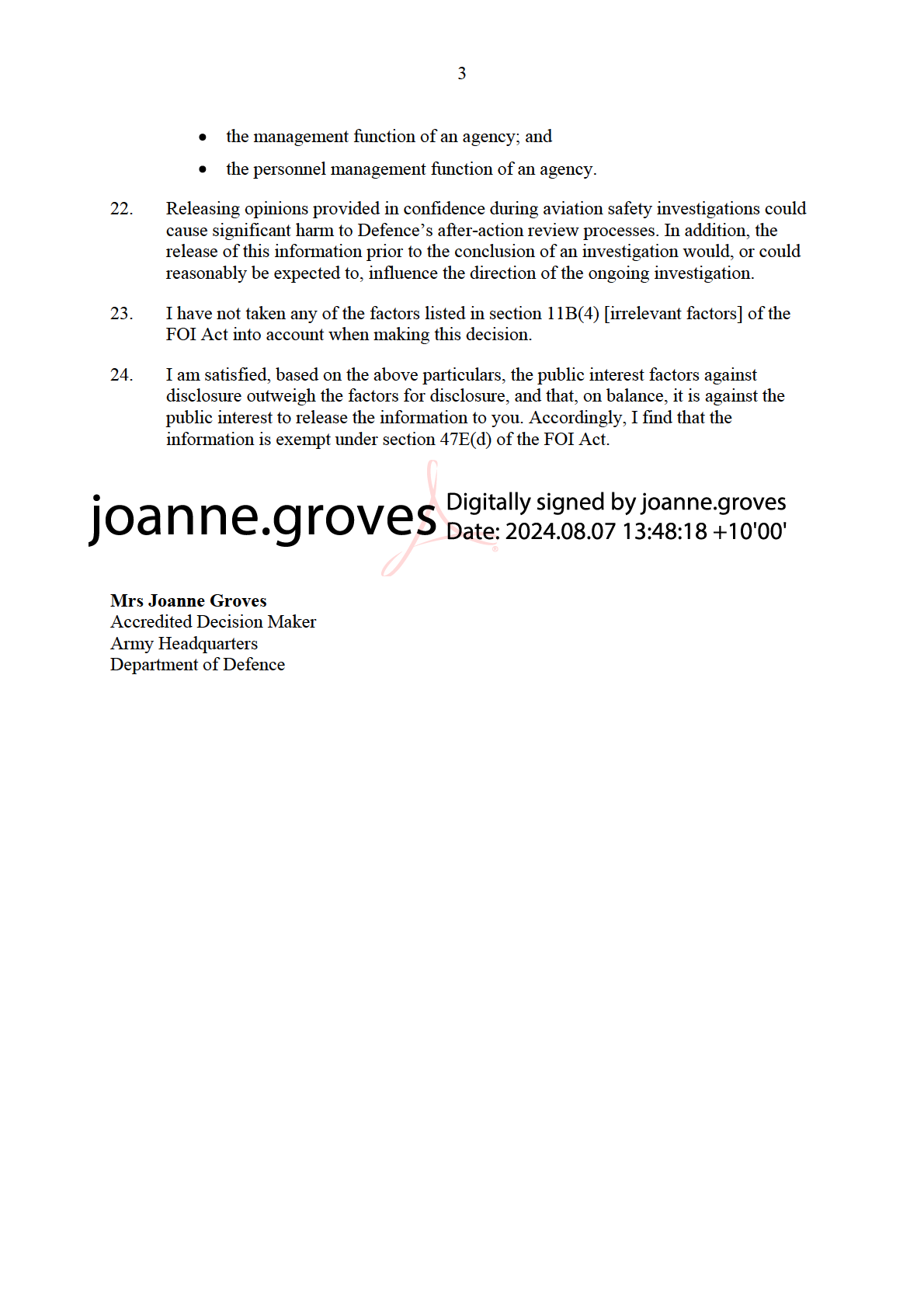


DEFENCE FOI 1005/23/24
STATEMENT OF REASONS UNDER THE FREEDOM OF INFORMATION ACT 1982
1.
I refer to the request by James Smith (the applicant), received by the Department of
Defence (Defence), for access to the following documents under the Freedom of
Information Act 1982 (Cth) (FOI Act):
Please provide all Work Health and Safety notices and reports, including Sentinel
Event Incident Reports and Notifications to Comcare in relation to the MRH-90 Taipan
helicopter
...I am willing to limit the time frame of the request from 2015 to date.
Background
2.
On 19 June 2024, the applicant submitted a request under the FOI Act to Defence in
the following terms:
Please provide all Work Health and Safety notices and reports, including
Sentinel Event Incident Reports and Notifications to Comcare in relation to the
MRH-90 Taipan helicopter.
3.
On 8 July 2024, Defence formally consulted with the applicant in accordance with
section 24AB of the FOI Act. On 9 July 2024, the applicant revised the scope of the
request as outlined in Paragraph 1.
FOI decision maker
4.
I am the authorised officer pursuant to section 23 of the FOI Act to make a decision on
this FOI request.
Documents identified
5.
I have identified one document as falling within the scope of the request.
Exclusions
6.
Duplicates of documents are excluded from this request. Defence has only considered
final versions of documents.
Decision
7.
I have decided to refuse access to the document on the grounds that the document is
considered exempt under section 47E(d) [Public interest conditional exemptions--
certain operations of agencies] of the FOI Act.
2
Material taken into account
8.
In making my decision, I have had regard to:
a. the terms of the request;
b. the content of the identified document in issue;
c. relevant provisions of the FOI Act;
d. the Guidelines published by the Office of the Australian Information
Commissioner under section 93A of the FOI Act (the Guidelines); and
e. advice from Defence Work Health and Safety Branch and Army Aviation
Command.
REASONS FOR DECISION
Section 22 Access to edited copies with exempt or irrelevant matter deleted
9.
Where a decision maker denies access to a document, section 22(1) of the FOI Act
requires that they consider releasing the document with exempt matter deleted, if
possible.
10.
Paragraph 3.98 of the Guidelines provides that:
an agency or minister should take a common sense approach in considering
whether the number of deletions would be so many that the remaining document
would be of little or no value to the applicant.
11.
I have considered disclosing the document to you with deletions, but have decided to
refuse access to the document as it would be meaningless and of little or no value once
the exempt material is removed.
Section 47E(d) Public interest conditional exemptions certain operations of agencies
12.
Section 47E of the FOI Act states:
A document is conditionally exempt if its disclosure under this Act would, or
could reasonably be expected to, do any of the following:
(d) have a substantial adverse effect on the proper and efficient conduct of
the operations of the agency.
13.
The Guidelines, at paragraph 6.115, provide that:
The predicted effect must bear on the agencys proper and efficient
operations, that is, the agency is undertaking its operations in an expected
manner.
14.
Upon assessment of the document, I found that it contained information concerning
the assessment of aircraft and the members involved in flying those aircraft. Further, it
is reasonable to expect an effect would result on the proper and efficient operations
of Defence should the document be released. I assess this effect to be significantly
2
adverse to the future aircraft operations of the Department and the personnel involved
in maintaining and flying those aircraft.
15.
This confidential aspect of aviation safety is vital for quickly and accurately
ascertaining issues and to delineate between human and mechanical error to ensure
that an incident is not replicated. Any erosion of that process could be expected to
diminish the quality and level of information available for the investigators to
determine the cause of any aviation incident.
16.
The Guidelines provide, at paragraph 6.112, that I should consider whether disclosure
of the document would, or could reasonably be expected to lead to a change in the
agencys processes that would enable those processes to be more efficient. I do not
consider that releasing the information could reasonably improve Defences aviation
safety investigation processes.
17.
Accordingly, I am satisfied that the document is conditionally exempt under section
47E(d) of the FOI Act.
Public interest considerations - section 47E(d)
18.
Section 11A(5) of the FOI Act states:
The agency or Minister must give the person access to the document if it is
conditionally exempt at a particular time unless (in the circumstances)
access to the document at that time would, on balance, be contrary to the
public interest.
19.
I have considered the factors favouring disclosure as set out in section 11B(3) [factors
favouring access] of the FOI Act. The relevant factors being whether access to the
document would:
(a) promote the objects of this Act (including all the matters set out in
sections 3 and 3A);
(b) inform debate on a matter of public importance;
(c) promote effective oversight of public expenditure.
20.
In my view, disclosure of this information would not increase public participation in
the Defence process (section 3(2)(a) of the FOI Act), nor would it increase scrutiny or
discussion of Defence activities (section 3(2)(b) of the FOI Act).
21.
Paragraph 6.233 of the Guidelines specifies a non-exhaustive list of public interest
factors against disclosure. The factors I find particularly relevant to this request are
that release of this information could reasonably be expected to prejudice:
the protection of an individuals right to privacy;
the interests of an individual or a group of individuals;
an agencys ability to obtain confidential information;
an agencys ability to obtain similar information in the future;




